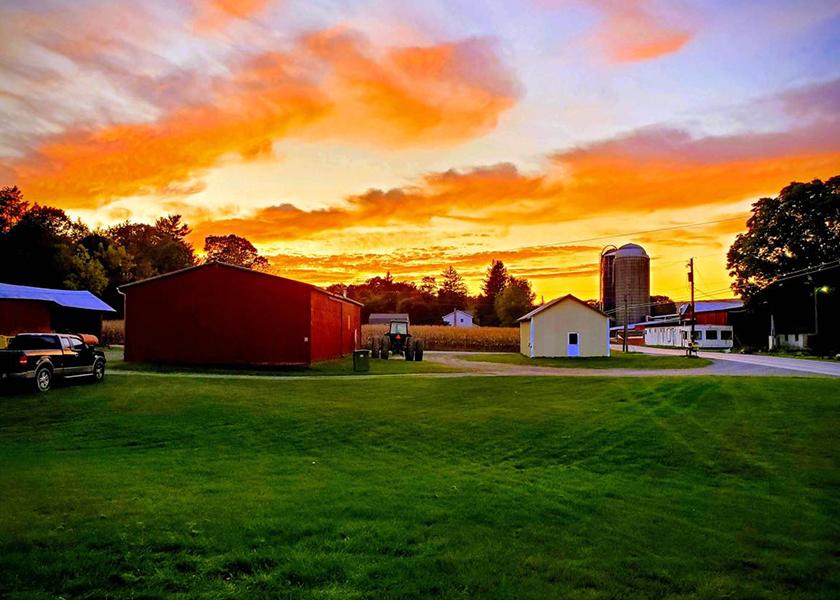The Nightmare Before Christmas, Part Two: Readington Producers Forced to Find New Milk Market

More than four months have passed since dairy producers Kent and Coreena Meyer opened a letter from their milk processor, Wakefern Food Corp., owner of Readington Farms in Whitehouse Station, N.J., informing them they no longer would pick up their milk.
A letter that was received in the mail the day before Christmas telling them they were losing their milk market. Every dairy producer’s worst nightmare. The Meyers were not alone, however. They were one of 150 farmers who ship their milk to Readington Farms who were completely blindsided when they received the Christmas Eve letter.
The Readington plant remained in the Durling family for four generations before being sold to Wakefern in 1990. Karen O’Shea, a Wakefern spokeswoman, stated, “After evaluating our existing capabilities and the changing consumer demand for milk and plant-based options, we recognized the need to have a facility that could produce a broader variety of beverages.”
Fast Forward
A certified letter from Readington went out to its patrons, stating that their last pick-up would be February 15th. The letter encouraged producers to discuss the next steps and that they would not automatically be transitioned to a processor.
Coreena Meyer immediately began doing her homework. She knew that between Dairy Farmers of America (DFA), Lanco-Pennland and Maryland & Virginia Milk Producers, there were options on the table as to where they could ship milk to.
“I began requesting comparisons for November final milk,” she says. “Then I followed up, asking for December pay prices.”
Located in Loganton, Penn., Meyer Dairy Farm LLC is home to 220 milk cows, 200+ replacement heifers and 450 acres of corn, alfalfa and grass. The Meyers have shipped their milk to Readington for more than 30 years.
The Meyers milk quality is exceptional, with a somatic cell count hovering around 67,000 and P.I. counts less than 2,000. “Everyone said they would love to take us on,” Coreena states. “Really, we looked at options closely and tried to figure out where we would take the least hit, not which one is the most comparable with Readington.”
Readington patrons’ premiums were reduced from $0.75 per cwt to $0.25 per cwt, effective for January’s milk. Those premiums were established a long time ago and were given to each of its producers. According to Meyer, the premiums previously range between $1.00 per cwt to $1.50 per cwt but decreased to $0.75 per cwt in 2021.
“It’s really hard to do a comparison because so much is changing,” the Meyers note. “It’s not like we can compare apples to apples.”
The Meyer family decided to switch to DFA, stating it was the best option that was on the table.
Factoring in over-base charges, additional stop charges and fewer quality premiums, and the Meyers say it all adds up.
“We’re losing money in comparison to what we were getting paid,” she says. “DFA was the best option for us.”
The Meyer family was able to keep the same hauler, which they are extremely thankful for. “We wanted to stick with him,” she says. “The company is on-time with pick up and he is just a very good milk hauler.”
The last checks from Readington were cut and issued. The Meyers report they did receive their Pandemic Volatility Assistance Program the end of January, as well as their last milk check.
“This all has been disheartening, frustrating and totally devastating to have this happen and dealt with so poorly, especially after shipping to them for more than 30 years,” Coreena shares.
Going on with Business
With every-other-day pick-up, business as usual is going on at Meyer Dairy. With the calendar recently flipping to May, the Meyers are trying to calculate how much nitrogen they will need for their fields.
“It’s crazy. All of it. Seed prices, input costs, fuel price. It's going to kill us,” Coreena says. “It’s all going to eat up the extra money that’s coming in now with the milk check.”
The Meyers reported that their last milk check was $25.93 per cwt.
“Even with the deductions, it still was the highest milk price we have ever received,” Coreena says.
The farm is reconsidering a project they had put off due to the low milk prices the last several years. “We want to pour concrete for a bunker project,” Coreena shares. “A couple of years ago the bid was $80,000 and now in 2022, the project is estimated to cost $125,000.”
The Meyers line of credit racked up to $200,000 after they pre-paid seed and other costs. “We recently consolidated that loan to free up the line of credit and to capitalize on lower interest rates. We wanted to free up the line of credit for emergencies to allow us to breathe.”
Doing just that gave their line of credit a clean slate in 2022, but the concrete project would require them to tap into it again.
Once again, the Meyers get out a pencil and paper and start doing their homework to figure out which is the best route to go. Just like they did with the nightmare before Christmas headache.
“I’m proud. I did my homework,” Corenna says. “I made a lot of phone calls and emails and worked to get comparisons.”
Meyers says that some of the other Readington patrons made knee-jerk decisions based on fear. She says fear-based on if they didn’t act fast, they wouldn’t have a milk market to ship to. Meyers said she stretched her decision out to the end, knowing that it was in her farm’s best interest to pencil the different scenarios out and find the best market for her milk.
“The nightmare with Readington could have ended in a train wreck,” she says. “That could have forced us out of business.”







